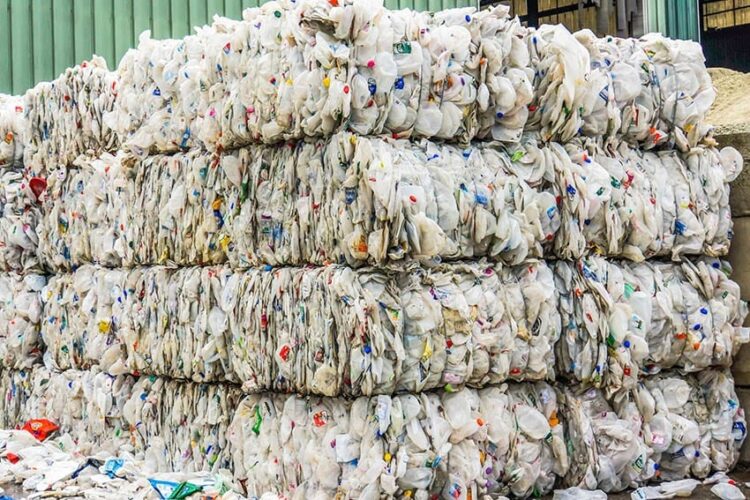Matium last month began the commercial launch of a platform that digitizes many aspects of the plastics recycling trading business. The company also received a recent funding boost from an economic development agency in Colorado.
Beyond connecting material buyers and sellers in the style of a social network, the company’s new platform provides data reporting tools that its creators say will become crucial in the era of emerging EPR regulations.
Founded in 2021 and in the trial stage since then, Matium recently commercialized its two key products: Network, which connects various stakeholders in the recycled plastics trading sector with a goal of simplifying buying and selling, and Core, an enterprise resource planning system that “automates all of the back of house operations and management” for plastics recycling firms, the company stated in a recent announcement.
Company co-founder and CEO Bailey Robin came up with the company concept after working as a recycled plastics broker for Bach Polymers, a Maryland-based subsidiary of Canusa Hershman, beginning in 2018.
“The job was, here’s a phone, here’s a laptop and here’s a Plastics News article, go call as many people as you can and ask them what they have, and call as many people as you can and ask them what they need,” Robin said.
He quickly came up with ways to improve his odds of connecting with the right suppliers and buyers. Robin noted sometimes he would call what he thought was a plastics recycling firm, only to be connected with someone who was not in the position to buy material. That led him to develop a way of identifying likely buyers: He started looking at Google Maps, using the satellite view to follow railroad tracks until he spotted a silo. That signaled a good lead, because “I knew they would buy at least a railcar” of material, Robin said.
Coming up with those types of timesavers led Robin to brainstorm about providing a tool that would simplify the material trading business on a wider scale. After three years brokering plastic, he began developing Matium with the initial idea of being a matchmaker, connecting buyers with sellers, and overall making transactions simpler.
Robin and his cousin, Alex Lambrides, founded Matium in April 2021, and the small team began developing the platform. The brokering network rolled out as a beta pilot-stage platform last year and continued to bring on more trial users this year, and the ERP side of the business was in its trial stage early this year. The platform’s commercial launch was on May 6, providing users the full functionality of being able to offer material on the platform and match with other users.
As of this week, the company had slightly more than 400 companies on the Network platform, an invite-only arena where a company can create a profile and connect with recycling firms, manufacturers, distributors and other stakeholders in the material chain.
The Core platform adds the ability to generate trading documents like purchase orders, bills of lading and shipping confirmations, as well as access to material trading analytics.
Matium is currently concentrated in the plastics sector, but the company has plans to be “material agnostic” in the future. Eric Mills, company director of operations, said the company’s goal is to become the largest anonymized commodity transaction ledger, “leading to a filterable — in any way that you want — heat map of supply and demand nodes.”
Opportunities within the EPR world
The Matium team sees an emerging need the company’s platform can fill within the plastics recycling sector, as a tool that facilitates collection and reporting of various data points.
“There’s going to be significant reporting requirements from a regulatory perspective, if not at the federal level, certainly at the state level where EPR laws are passing in multiple states,” said Jenifer Freeman, an external engagement strategist who is working with Matium.
Indeed, producer responsibility organizations, or PROs, are going to have to report certain data to the regulating agencies, and in some cases it’s data they’ve never had to collect before. Industry experts have warned that meeting data collection and reporting requirements is going to be a huge task, one that producers must gear up for quickly.
The company’s potential to help in an EPR environment were recently highlighted in Colorado, one of the five U.S. states where legislation establishing EPR for packaging has been approved and a regulatory system is in development. The Colorado Office of Economic Development and International Trade on May 16 announced Matium was awarded an Early Stage Capital and Retention Grant totaling $250,000, to help scale up its “raw material trading solution with unparalleled data insights and operational efficiencies.”
“As Colorado implements its extended producer responsibility for recycling program, this tool and the webbing it creates will be essential to ensuring that the enhanced amounts of material collected will go back into the supply chain, rather than the landfill,” Matium stated in announcing the grant funds.
The company added that the “most powerful impact of this tool will be in the data and analytics imbedded in the solution. In a system devoid of reliable data to inform infrastructure investments on both the public and private side, the collated data the Matium will capture will empower and enable governments and businesses to build smarter, more efficient recycling systems and supply chains.”
A version of this story appeared in Plastics Recycling Update on June 5.






























